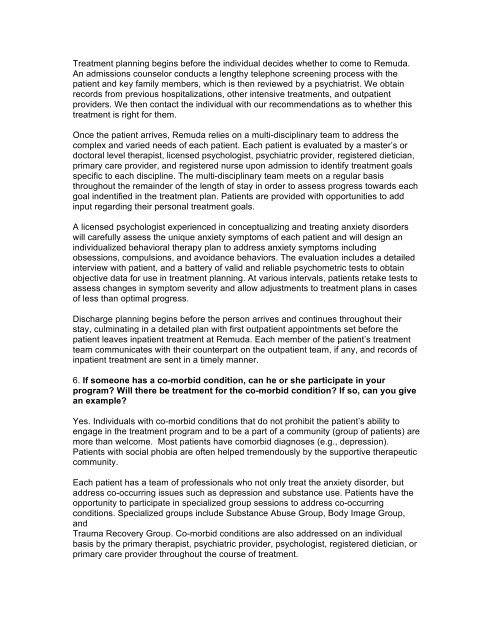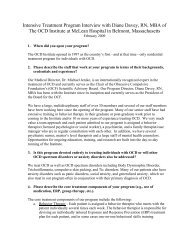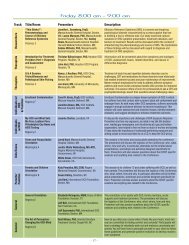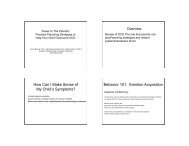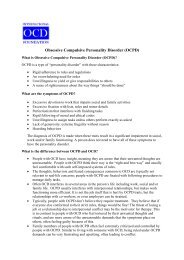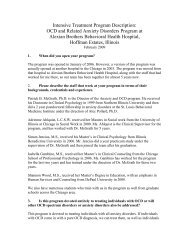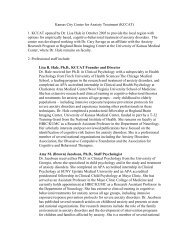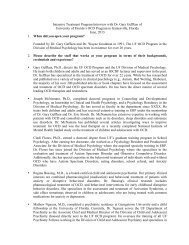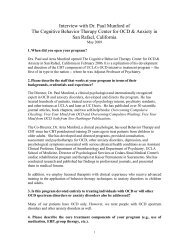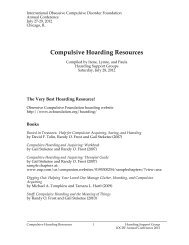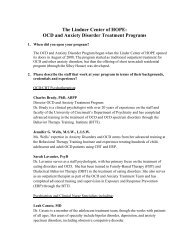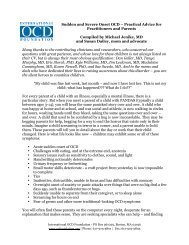When Did You Open Your Program? - Obsessive-Compulsive ...
When Did You Open Your Program? - Obsessive-Compulsive ...
When Did You Open Your Program? - Obsessive-Compulsive ...
You also want an ePaper? Increase the reach of your titles
YUMPU automatically turns print PDFs into web optimized ePapers that Google loves.
Treatment planning begins before the individual decides whether to come to Remuda.<br />
An admissions counselor conducts a lengthy telephone screening process with the<br />
patient and key family members, which is then reviewed by a psychiatrist. We obtain<br />
records from previous hospitalizations, other intensive treatments, and outpatient<br />
providers. We then contact the individual with our recommendations as to whether this<br />
treatment is right for them.<br />
Once the patient arrives, Remuda relies on a multi-disciplinary team to address the<br />
complex and varied needs of each patient. Each patient is evaluated by a master’s or<br />
doctoral level therapist, licensed psychologist, psychiatric provider, registered dietician,<br />
primary care provider, and registered nurse upon admission to identify treatment goals<br />
specific to each discipline. The multi-disciplinary team meets on a regular basis<br />
throughout the remainder of the length of stay in order to assess progress towards each<br />
goal indentified in the treatment plan. Patients are provided with opportunities to add<br />
input regarding their personal treatment goals.<br />
A licensed psychologist experienced in conceptualizing and treating anxiety disorders<br />
will carefully assess the unique anxiety symptoms of each patient and will design an<br />
individualized behavioral therapy plan to address anxiety symptoms including<br />
obsessions, compulsions, and avoidance behaviors. The evaluation includes a detailed<br />
interview with patient, and a battery of valid and reliable psychometric tests to obtain<br />
objective data for use in treatment planning. At various intervals, patients retake tests to<br />
assess changes in symptom severity and allow adjustments to treatment plans in cases<br />
of less than optimal progress.<br />
Discharge planning begins before the person arrives and continues throughout their<br />
stay, culminating in a detailed plan with first outpatient appointments set before the<br />
patient leaves inpatient treatment at Remuda. Each member of the patient’s treatment<br />
team communicates with their counterpart on the outpatient team, if any, and records of<br />
inpatient treatment are sent in a timely manner.<br />
6. If someone has a co-morbid condition, can he or she participate in your<br />
program Will there be treatment for the co-morbid condition If so, can you give<br />
an example<br />
Yes. Individuals with co-morbid conditions that do not prohibit the patient’s ability to<br />
engage in the treatment program and to be a part of a community (group of patients) are<br />
more than welcome. Most patients have comorbid diagnoses (e.g., depression).<br />
Patients with social phobia are often helped tremendously by the supportive therapeutic<br />
community.<br />
Each patient has a team of professionals who not only treat the anxiety disorder, but<br />
address co-occurring issues such as depression and substance use. Patients have the<br />
opportunity to participate in specialized group sessions to address co-occurring<br />
conditions. Specialized groups include Substance Abuse Group, Body Image Group,<br />
and<br />
Trauma Recovery Group. Co-morbid conditions are also addressed on an individual<br />
basis by the primary therapist, psychiatric provider, psychologist, registered dietician, or<br />
primary care provider throughout the course of treatment.


